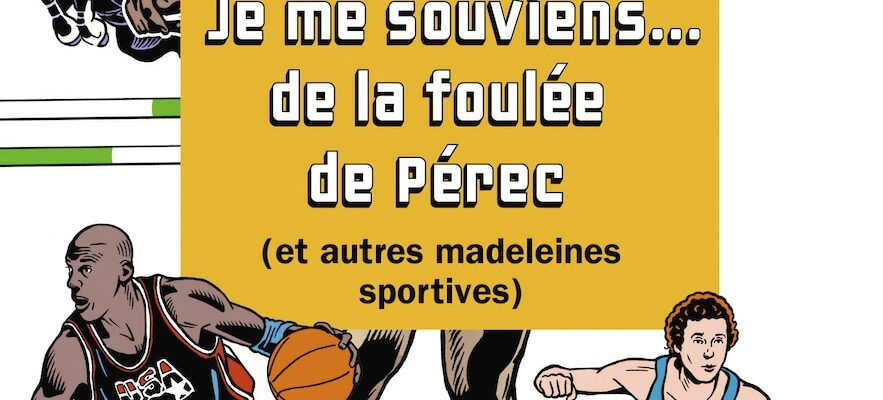I remember. Summer 1992. I am thirteen years old and I am watching the Barcelona Olympics on TV. I am thirteen years old, I am on a long vacation in Spain with my parents, we are a family of immigrants from Bilbao, a city where we spend every July. It is summer in the city with the other children of the neighborhood, the first kisses in the vacant lots and the torpor of the afternoon, in the refreshing shade of the apartments, shutters closed, in front of the television. I do not know what it is like to live without the television on. My parents watched it constantly. Listened to it. […]
As a teenager, I had a preference for fiction with rich young Anglo-Saxons by the sea who live high school and love stories. My father, his preference was sports. Football, tennis, cycling, boxing, athletics. That’s how I started watching competitions, tournaments, with a clear preference for the Football World Cups, Roland-Garros (I dreamed of being the new Arantxa Sanchez without ever having touched a racket) and athletics. I wanted to be an athlete. […]
As for my father, his sports practice existed only by proxy. He had an oversized beer-drinker’s belly, the physique of an alcoholic lymphatic, and he was incapable of running, due to the three packs of unfiltered Camel that he consumed every day. That summer, glued to the sofa of paid leave and summer vacation, we would go and shiver together watching the various competitions of the Olympic Games.
“He’s a birdman Carl Lewis”
Opening ceremony. I had begged him to watch it, he wasn’t interested in this funfair side. Spanish music with fiery brass instruments accompanies the dancers who write HOLA with their oversized red and yellow skirts, twirling around the stadium, emotion in the stands, musicians dressed in leopard print like Dali, and then, the kings of Spain, the majesties, on thrones. My father begins to insult royalty and patriotic music: “This show has nothing to do with the Games, if I wanted to see clowns I would have gone to the circus, joder !”
I will always remember the phrase he repeated to me. My father was just waiting for him: “Carl Lewis, he is the fastest man in the world.” I think he was in love with him. My father vibrated at each of his appearances, a human arc launched towards surpassing. Because Lewis, the man with the gold medals, had a physique that would make Mount Olympus pale. And an irresistible smile.
August 5-6, 1992. The long jump. “This is going to be very interesting. Carl Lewis and Mike Powell! It’s their reunion, after the World Championships held a year earlier in Tokyo.” Mike Powell takes off, he runs. “Last year, he broke the world record, 8.95 m. I think Carl will beat it today. Here in Spain. Maybe. He’s a birdman Carl Lewis.”
Run-up, impulse, flight, reception. Six attempts. Run. Launch yourself into the void. Counter gravity. Run through the air. Go as far as possible. Bite the dust. I believe that the long jump is life. My father and the fastest man in the world. On the world chessboard, Carl and Julian were diametrically opposed. Two silhouettes, two colors, two nations, two destinies. A stadium, a sofa. Vitamins, unfiltered Camels.
The Shadow of Freddie Mercury
What goes on in my father’s head and heart when he watches Carl run? He sees a hero. An ancient marble god who comes to life, muscles tensed in the conquest of speed. My father loves no one and yet. I am overwhelmed by this father almost fossilized by his life as a worker, the one who does not let himself be softened by fiction, but stops breathing when another man gives the push with his foot to fly into the air. Carl Lewis in my father’s eyes. The other athletes on those two days in August 1992 are extras, 7 m 87, 7 m 98, 8 m 04.
Carl has already won from the first attempt: 8 m 67. Mike Powell will try to catch up with him, until the last jump, 8 m 64. Almost. The gold medal will once again surround the neck of the fastest man in the world. The stadium exults. My father smiles. He knew it, he says. The two adversaries embrace, under a single flag, USA, that of America triumphant over the Gulf War and MTV. A hug between two men. I think my father would also like to hug Carl Lewis. And I can see him, bringing Mike Powell to the bar to ask him: “Do you prefer a world record or a gold medal? Or both? You have to choose.” He liked to play this game of preferences, do you prefer your father or your mother? To eat this or that? (He invented disgusting things to eat that I will not mention here.) Barcelona! Barcelona! I hum, I sing, finally I scream the song by Freddie Mercury and Montserrat Caballé as I remember today that summer of 1992. Freddie Mercury dies of AIDS nine months before the opening of the Games. He will not go on stage with the song he wrote for the ceremony.
“For ti seré gaviota de tu bella mar.”
“For you I will be a seagull of your beautiful sea,” Freddie and Montserrat sing in chorus.
Far from Barcelona and the Mediterranean Sea, I remember looking at my father who was looking at Carl Lewis. I was looking at my father who was happy. I was looking at my father and he was saying: “Carl Lewis is the man who is the quickest man in the world. Because Lewis is the hombre-pajaro.” […]
Taken from I remember… Perec’s stride (and other sporting madeleines)directed by Benoît Heimermann. Seuil, 226 p., €19.90.
When 27 writers remember their favorite Olympics
© / Edition of the Threshold
